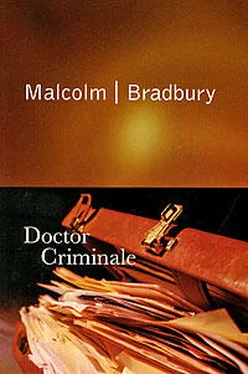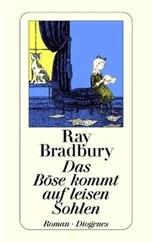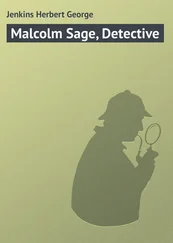Malcolm Bradbury - Doctor Criminale
Здесь есть возможность читать онлайн «Malcolm Bradbury - Doctor Criminale» весь текст электронной книги совершенно бесплатно (целиком полную версию без сокращений). В некоторых случаях можно слушать аудио, скачать через торрент в формате fb2 и присутствует краткое содержание. Город: London, Год выпуска: 2000, ISBN: 2000, Издательство: Picador, Жанр: Современная проза, на английском языке. Описание произведения, (предисловие) а так же отзывы посетителей доступны на портале библиотеки ЛибКат.
- Название:Doctor Criminale
- Автор:
- Издательство:Picador
- Жанр:
- Год:2000
- Город:London
- ISBN:978-0330390347
- Рейтинг книги:5 / 5. Голосов: 1
-
Избранное:Добавить в избранное
- Отзывы:
-
Ваша оценка:
- 100
- 1
- 2
- 3
- 4
- 5
Doctor Criminale: краткое содержание, описание и аннотация
Предлагаем к чтению аннотацию, описание, краткое содержание или предисловие (зависит от того, что написал сам автор книги «Doctor Criminale»). Если вы не нашли необходимую информацию о книге — напишите в комментариях, мы постараемся отыскать её.
Doctor Criminale — читать онлайн бесплатно полную книгу (весь текст) целиком
Ниже представлен текст книги, разбитый по страницам. Система сохранения места последней прочитанной страницы, позволяет с удобством читать онлайн бесплатно книгу «Doctor Criminale», без необходимости каждый раз заново искать на чём Вы остановились. Поставьте закладку, и сможете в любой момент перейти на страницу, на которой закончили чтение.
Интервал:
Закладка:
Though the Archdukes of Wurttemberg had been famed for their philosophical reverence for nature, this had plainly not prevented them attacking it violently from time to time. The tusked heads of angry boar, the soft eyes of tender does, the beady gaze of predatory buzzards, stared down from the gothic walls beside the weaponry that had engineered their slaughter. Down below the Postmoderns were already gathering: dusty Eastern Europeans, exhausted from their journeys on wandering Mitteleuropean trains or obscure airlines that timed their departures not by the minute but the day; our feisty Americans, filled with jouissance and clad in the designer sports clothing that tells us ours is an age of play. The heat hung heavy, but there were tables in the courtyard where you could battle dehydration with good Swabian wine.
We started that night with a candelit dinner in the great hall. There were no candles, thanks to strict German fire regulations, but the East Europeans did not mind. As one of them explained, what they usually have is a candlelight dinner with no dinner. They were just as pleased over the following days, as the lectures and seminars unfolded. As they told me, when I interviewed them, after forty-five years of grim old unreality they were delighted to learn of the bright new unreality. Our postmodern Americans did truly Sterling work: we covered everything, Chaos Theory and commodity fetishism, glitz architecture and depthless art, computer culture and cyberpunk, dead irony and global gentrification, the literature of exhaustion and the literature of replenishment. And when we, too, were exhausted, we replenished ourselves, out in the courtyard, drinking the Swabian wines in the unending heat.
There were blips and aporias, of course. Professor Henri Mensonge failed to arrive, even though when his office was phoned we were told he had left. No message of explanation ever came, though his name remained in the programme as the sign of his absence. In the event, a jolly boat-trip down the Neckar River proved an effective substitute, a relief from the deeply unpleasant weather. It remained too hot to sleep at night (but who, at a congress, wants to?), too hot to think, too hot to shave. Then, on the fourth day, when the sun rose yet again in the murky sky like, well, why not a bright and unburnished shield (simile was not entirely an acceptable trope at Schlossburg), deliverance came, and Bazlo Criminale stepped among us.
He arrived, alone, in a taxi, clad in one of his shining blue suits, hair splendidly bouffanted, mopping his brow. By the time he was out and climbing the lodge steps, a small but deeply admiring crowd had gathered to greet him. I looked, and thought him decidedly jaded; the bounce had gone somehow from his step, there was weariness in his manner. Then I learned what was wrong. At Frankfurt airport, where Otto Codicil had come to grief, as have others in the past, Criminale had lost touch with his luggage. Lufthansa had invented a whole new concept of airline travel, a new aircraft that has no wings, never leaves the ground, runs on tracks and is tugged by an engine. Naive people might call it a train, but it had an airline flight number, boarding passes, and flight attendants who served microwaved food. Flying in from LA, Criminale, being human, had successfully made this unusual change of craft. His baggage, being inanimate and dumb, had not. Even now it was either shuttling back home to LA or being blown up by the anti-terrorist squad as unattended luggage.
I looked at Criminale, and felt sorry for him: even sorrier, for him and all of us, when I learned that his suitcase not only contained more fine suits and distinguished shirts, eventually replaceable, but notebooks holding his work of the last weeks, the draft of a new novel, successor to Homeless , which was not. Angry calls flew here and there; the airport reported that nothing had been found. Criminale retired furiously to his upstairs suite; I learned from the conference organizers that he was cancelling all his onward engagements – his lectures in Belgrade and Macerata, his honorary degree in Stockholm, and several diplomatic treats. He had decided to remain at Schlossburg, close to his German publisher, for as long as his missing luggage took to reappear, which could well be many days, if at all. Dismayed for him, I now suddenly felt dismayed for myself. We were a small group, of around thirty, who breakfasted, lunched, and dined together; I could not go on avoiding him for ever.
My first thought was to leave, but something stopped me. Now Criminale was back in my sightlines, now he was writing fiction again, my curiosity revived. I wanted to find out how it was with him, what he was up to, how he thought these days. In the end I chose the Ildiko strategy. Let him hold the foreground, where he liked to be; I would keep to the background, remaining as obscure as I naturally was. And so when, later that afternoon, Criminale reappeared, and stood up on the podium in the gothic hall to give his keynote lecture, simply and purely entitled ‘The Postmodern Condition’, I was there, face in shadow, in the darkest flange of the very back row.
Criminale started seriously enough, singing the song of the names that always toll on these occasions: Habermas and Horkheimer; Adorno and Althusser; De Man and Derrida; Baudrillard and Lyotard; Deleuze and Guattari; Foucault and Fukuyama. He reflected on all those things that cheer thinking spirits up these days – the end of humanism, the death of the subject, the loss of the great meta-narratives, the disappearance of the self in the age of universal simulacra, the depthlessness of history, the slippage of the referent, the culture of pastiche, the departure of reality, and so on. Then his manner grew more personal, his tone more sharply ironic; it had always struck me at Barolo that, for a philosopher, Criminale was somehow peculiarly personal. He reminded us of his own famous phrase, that in such a time philosophy itself could only be ‘a form of irony’.
As he turned to this, I felt something was affecting him. Maybe it was the loss of his suitcase, and the manuscript with it; possibly it was the presence of so many of his fellow Eastern Europeans in the audience in front of him. At one point I thought perhaps it was even my own presence there; several times in the lecture I thought I caught him staring straight at me, in what seemed a questioning way. The postmodern condition, he now started to say, was something more than a post-technological situation, a phenomenon of late capitalism, a loss of narratives, or whatever the interpreters called it. What it most resembled, he said, was his own situation now—jet-lagged, culture-shocked, stuffed with too much inflight food and too much vacant inflight entertainment, mind disordered, body gross, thoughts hectic and hypertense, spirits dislodged from space and time, baggageless, without normal possessions.
‘How to sum up?’ he asked at last, as we sweated grossly in the foetid hall, ‘Leibniz, a good man, once told the first question of philosophy is: why is there something rather than nothing? We are more lucky, we have proved him wrong. Now we can honestly say: there is much more nothing, so how can you show me something? Here am I, a theoretical nothing, a dead subject. I have travelled three thousand miles through a world of very little to lecture to you from the heartless heart of my nothing on the state of nothing as I understand it. So please, friends, especially East European friends, who are not aware of all these affairs yet: let me welcome you, very personally, to the postmodern condition. Now thank you, one or two questions.’ As a few bemused questions began arising from the floor, I slipped away.
A little later, from the balcony of my room, I looked down at the courtyard and saw Criminale. The usual crowd of admirers was around him; he was mopping his brow, his suit evidently far too heavy for the sultry weather. He went and stood by a wooden balustrade; a group of conferees pressed all round him. Criminale straightened his body nobly, raised his eyes, and seemed to stare directly at the sun. What was happening? Nothing at all significant, I realized. All the conferees had brought their cameras; and Criminale was simply having his photograph taken. I slipped downstairs and went out, to take a quiet, I hoped cooling, walk in the vast romantischer grounds, and gather up some questions for an interview I wanted to do with a Romanian participant just before dinner. The informal gardens quickly gave way to thick trees and wilderness, the rough path sloped down towards the river.
Читать дальшеИнтервал:
Закладка:
Похожие книги на «Doctor Criminale»
Представляем Вашему вниманию похожие книги на «Doctor Criminale» списком для выбора. Мы отобрали схожую по названию и смыслу литературу в надежде предоставить читателям больше вариантов отыскать новые, интересные, ещё непрочитанные произведения.
Обсуждение, отзывы о книге «Doctor Criminale» и просто собственные мнения читателей. Оставьте ваши комментарии, напишите, что Вы думаете о произведении, его смысле или главных героях. Укажите что конкретно понравилось, а что нет, и почему Вы так считаете.











